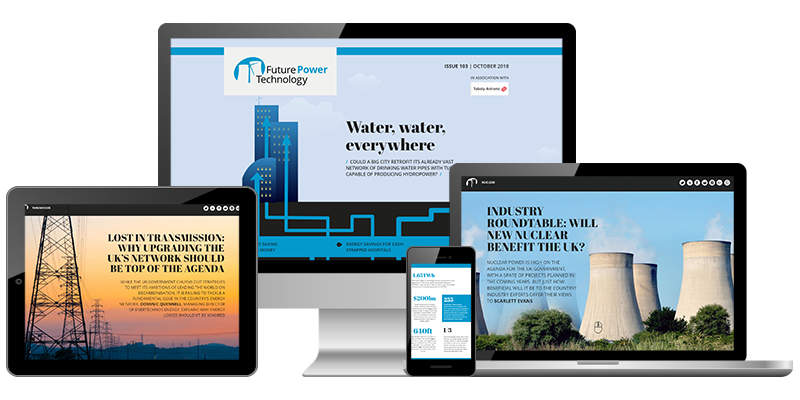
The October issue of Future Power Technology is out now and you can read it here for free on all devices.
A new report published by Eurelectric examines the impact blockchain will have on Europe’s distribution network operators. The digital ledger technology is a potential threat to operators, offering a cheaper and more efficient alternative, but with it comes concerns of a monopolised network system. Could blockchain spell the end for the traditional network distribution model?
We also find out more about a mobile app that allows Northern Powergrid customers to win cash prizes by turning off appliances at times of peak demand, consider whether a big city can retrofit its already vast network of drinking water and sewage pipes with turbines capable of producing hydropower, and in a special roundtable feature we ask experts for their opinions on new nuclear in the UK.
Plus, we talk to Centrica about how an organisation as large and unwieldy as the NHS could benefit from an energy upgrade, investigate the role of water in the coal supply chain, and address the £1.3bn worth of energy loss in the UK due to poor cabling.
In this issue
Will blockchain disrupt the traditional distribution network model?
A new report highlights how blockchain could be adopted to manage increasingly decentralised energy sources being introduced to the grid. The technology could create a more efficient system, but could it also create disruption for traditional network operators? Heidi Vella finds out.
Read more.
Power games: switching consumers on to demand side response
The GenGame mobile app allows Northern Powergrid customers to win cash prizes by turning off appliances at times of peak demand. Julian Turner takes a closer look at the scheme, which also gathers data on the expected growth in household energy use as electric vehicles come online.
Read more.
Can a city’s water infrastructure produce hydropower?
Could a big city retrofit its already vast network of drinking water pipes with turbines capable of producing hydropower? Molly Lempriere considers whether this seemingly simple energy solution could gain traction.
Read more.
Industry roundtable: will new nuclear benefit the UK?
Nuclear power is high on the agenda for the UK Government, with a spate of projects planned in the coming years. But just how beneficial will it be to the country? Industry experts offer their views to Scarlett Evans.
Read more.
Repowering healthcare: unlocking energy savings for cash-strapped hospitals
According to Centrica, the NHS could save £130m a year by upgrading outdated energy technologies. Centrica Business Solutions head of business development for healthcare Tony Orton offers Chris Lo his insight on how the organisation could benefit from an energy upgrade.
Read more.
A thirsty business: factoring water into the true cost of coal
South Africa’s Life After Coal campaign is calling for a closer look at coal’s impact on water. But just what are the true costs of the coal industry? Scarlett Evans investigates.
Read more.
Lost in transmission: why upgrading the UK’s network should be top of the agenda
While the UK Government churns out strategies to meet its ambitions of leading the world on decarbonisation, it is failing to tackle a fundamental issue in the country’s energy network. Dominic Quennell, managing director of Enertechnos Energy, explains why energy losses shouldn’t be ignored.
Read more.
Preview – Future Power November
The Taiwanese Government has been quick to roll out several very attractive renewable energy policies, including a feed in tariff for offshore wind comparable to zero subsidy plans in Europe. While offshore wind is by far the major driver, the government has also invested significantly in solar while decreasing reliance on nuclear. We take a look at Taiwan’s renewable energy ambitions.
We also consider the impact of China’s move to slash subsidies on solar development in the country, take a closer look at the development of a new generation of organic solar cells, which replace traditional silicon with organic photovoltaics made from carbon and plastic, and speak to MIT energy professor Jessika Trancik to find out how data can be used to judge the strengths and weaknesses of competing energy technologies.
Plus, we investigate a breakthrough from the University of Glasgow, where a team has developed a prototype system that uses a metal oxide ‘exotic rust’ that can be charged when added to water or hydrogen, creating a liquid battery that can charge as quickly as a petrol tank can be filled, and ask whether the UK Government should subsidise small nuclear reactors to reshape the economics of the industry.



